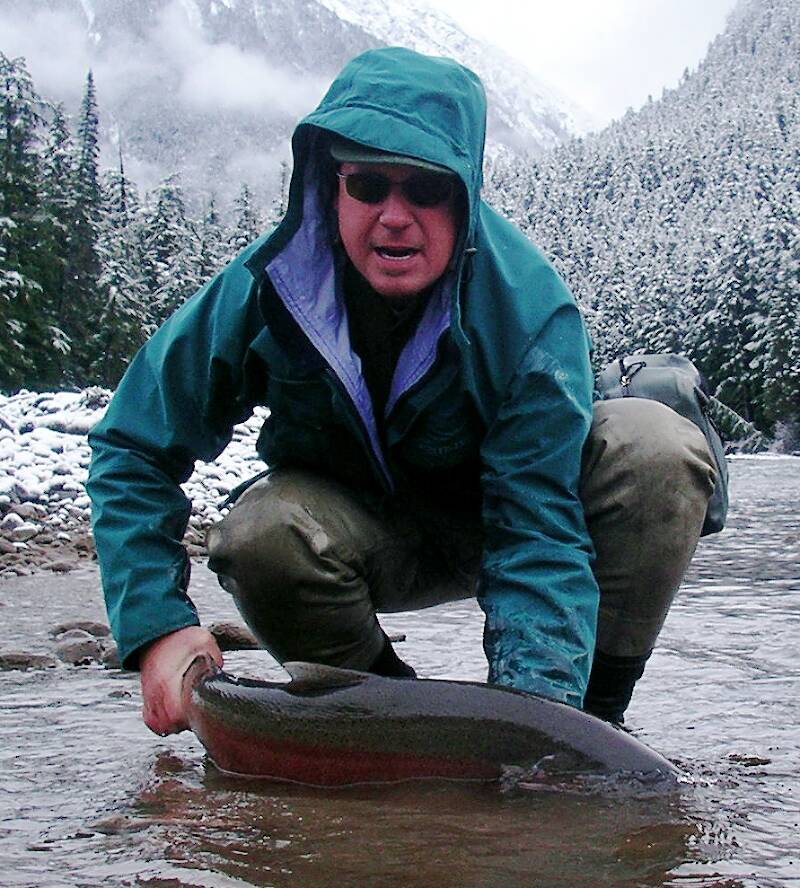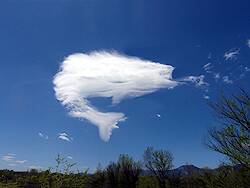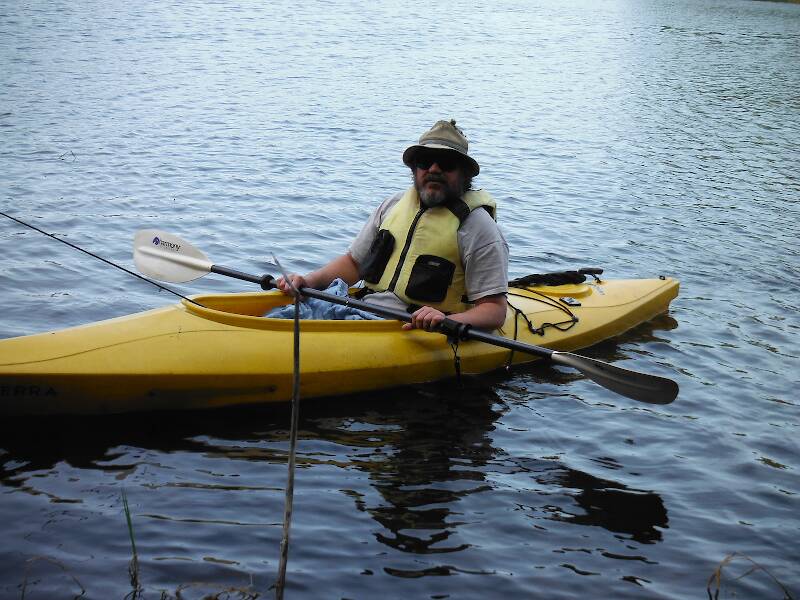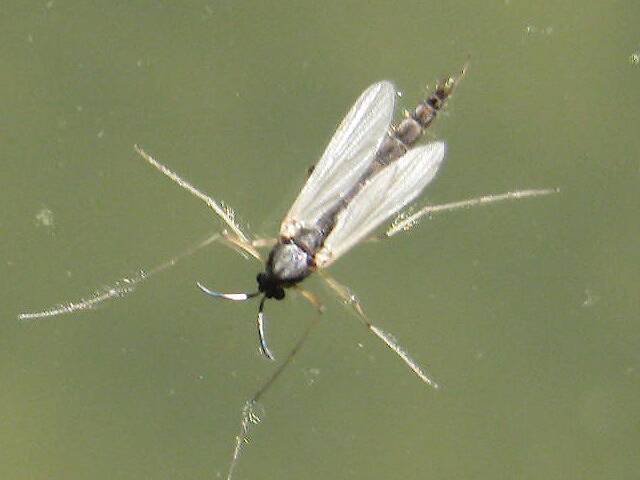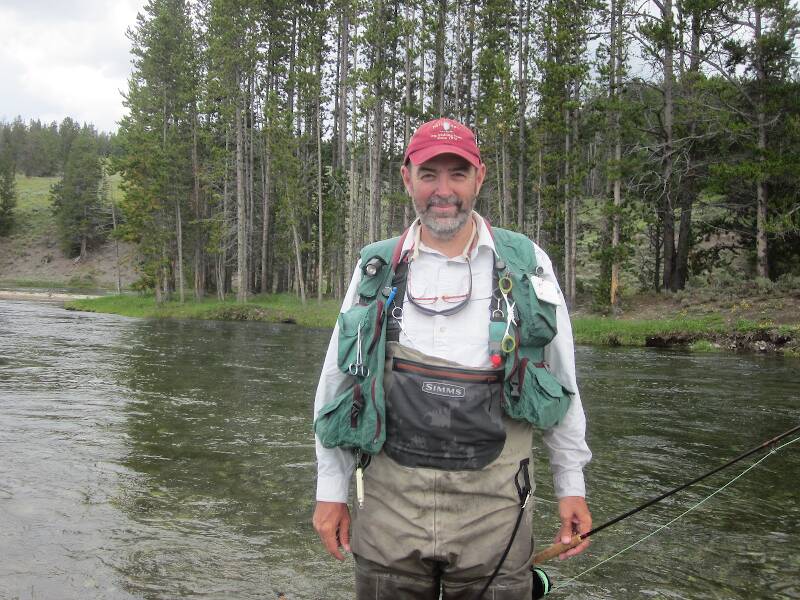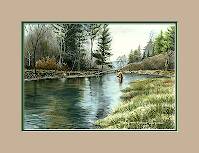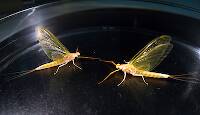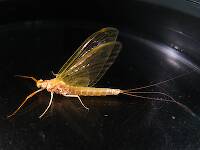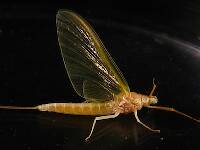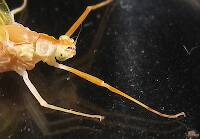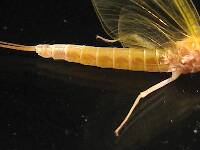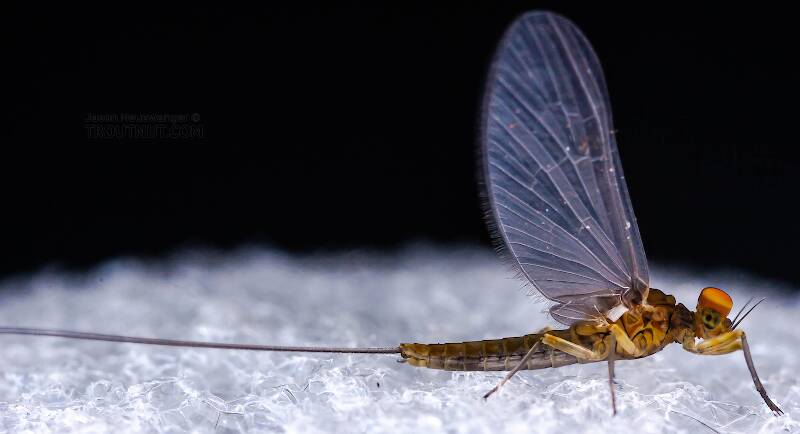
Blue-winged Olives
Baetis
Tiny Baetis mayflies are perhaps the most commonly encountered and imitated by anglers on all American trout streams due to their great abundance, widespread distribution, and trout-friendly emergence habits.
Featured on the forum
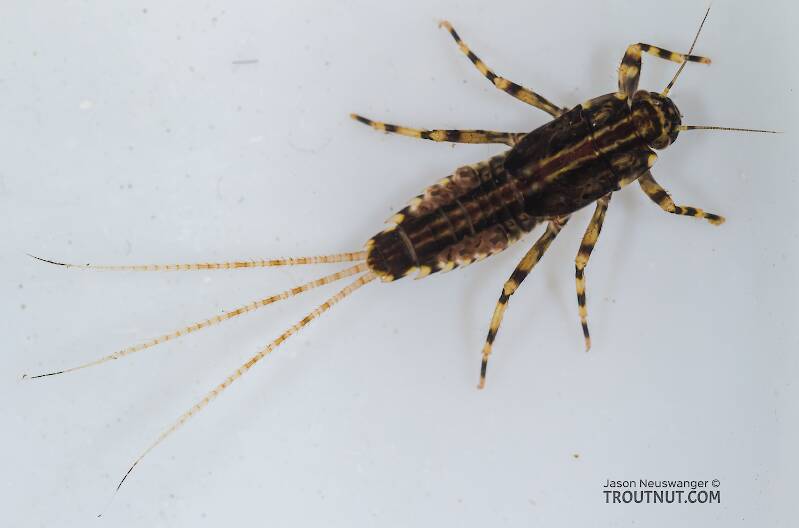
This is an interesting one. Following the keys in Merritt R.W., Cummins, K.W., and Berg, M.B. (2019) and Jacobus et al. (2014), it keys clearly to Ephemerella. Jacobus et al provide a key to species, but some of the characteristics are tricky to interpret without illustrations. If I didn't make any mistakes, this one keys to Ephemerella mucronata, which has not previously been reported any closer to here than Montana and Alberta. The main character seems to fit well: "Abdominal terga with prominent, paired, subparallel, spiculate ridges." Several illustrations or descriptions of this holarctic species from the US and Europe seem to match, including the body length, tarsal claws and denticles, labial palp, and gill shapes. These sources include including Richard Allen's original description of this species in North America under the now-defunct name E. moffatae in Allen RK (1977) and the figures in this description of the species in Italy.

Troutnut is a project started in 2003 by salmonid ecologist Jason "Troutnut" Neuswanger to help anglers and
fly tyers unabashedly embrace the entomological side of the sport. Learn more about Troutnut or
support the project for an enhanced experience here.
Smokeybaum on Feb 16, 2011February 16th, 2011, 5:33 pm EST
I have begun a study of aquatic insects and have a number of technical texts on my desk. Mostly they list just the scientific name of bug of interest. Fine and dandy except when I attempt to pronounce the name no one knows what I am talking about. I know there are phonetic pronunciation guides available somewhere out there but where? I've looked all over the internet and struck out. Any ideas as to where I might look to find such a guide?
Ideally such a list would contain the common name, the scientific name and the phonetic pronunciation of the scientific name.
Thanks DB.
Ideally such a list would contain the common name, the scientific name and the phonetic pronunciation of the scientific name.
Thanks DB.
Taxon on Feb 16, 2011February 16th, 2011, 7:32 pm EST
Hi Dave-
There are two books which have a guide for phonetic pronunciation of mayfly scientific names, Hatches II by Caucci & Nastasi (on pages 35-36), and Mayflies by Knopp & Cormier (on pages 344-346). Other than that, you are pretty much on your own, unless you are interested enough to learn the rules for pronouncing scientific names, about which there is considerable controversy.
For example, some claim the correct phonetic pronunciation of Baetidae is bait-ah-day, while others (myself included) believe it is beet-ah-dee.
In any event, here is a names query which can be used to look up both common and scientific names.
There are two books which have a guide for phonetic pronunciation of mayfly scientific names, Hatches II by Caucci & Nastasi (on pages 35-36), and Mayflies by Knopp & Cormier (on pages 344-346). Other than that, you are pretty much on your own, unless you are interested enough to learn the rules for pronouncing scientific names, about which there is considerable controversy.
For example, some claim the correct phonetic pronunciation of Baetidae is bait-ah-day, while others (myself included) believe it is beet-ah-dee.
In any event, here is a names query which can be used to look up both common and scientific names.
Entoman on Feb 16, 2011February 16th, 2011, 9:20 pm EST
Hi DB,
Boy have you asked a 64 dollar question!
As far as phonetics go, there is an index in "Mayflies" by Knopp & Cormier; also in a couple of books from the pens of Caucci & Nastasi. Possibly Swisher & Richards as well? They are for mayflies only, but you will get the drift and be able to apply the rules to the other insect orders after awhile. Both use primarily anglicized Latin with a few minor disagreements (ex. Baetis - Beet-us and Bait-us). Unfortunately, neither one shows the accent of syllables, so you're on your own (along with everybody else) in that regard.
While written the same universally, it is my understanding there are four ways Latin is currently pronounced:
1) Church Latin - Italian influence
2) Scientific Latin - influence from other common languages, i.e. English, German, French, etc. The English speaking world uses "Anglicized Latin"
3) Universal Latin - synthesized and taught over the last 50 years or so with the express goal of reducing verbal confusion among French, German, English, and other scientists of different nationalities. Claimed to be "closer to the original pronunciation", whatever that means.
4) Fisherman's Latin - any way you can get it out of your mouth
To illustrate, take the word "Caesar" (as in Julius) that incorporates the commonly used "c" and diphthong "ae":
the church - ch-eye-ser
scientific - see-ser (though the c can also be hard (ex. ch))
universal - k-eye-ser
Fisherman's - whatever works (I usually say "seezer")
I have my doubts that the universal will ever supplant the anglisized for the simple reason that too many bug names incorporate english proper and geographic names, not to mention Greek. Also, pronunciations are handed down from entomologist to entomologist (not wise for a whipper-snapper student to correct his professor)
Bottom line, I don't think there is a "right" way. It's bad form to correct someone's pronunciation anyway, so don't worry about it too much. The main thing is to learn it so you can write about it. The "Bugmeisters" in this forum probably say the words differently, but their spelling is always precise. Is that pronounced bug-me-ster or bug-my-ster? Gees...
Best regards,
Kurt
Boy have you asked a 64 dollar question!
As far as phonetics go, there is an index in "Mayflies" by Knopp & Cormier; also in a couple of books from the pens of Caucci & Nastasi. Possibly Swisher & Richards as well? They are for mayflies only, but you will get the drift and be able to apply the rules to the other insect orders after awhile. Both use primarily anglicized Latin with a few minor disagreements (ex. Baetis - Beet-us and Bait-us). Unfortunately, neither one shows the accent of syllables, so you're on your own (along with everybody else) in that regard.
While written the same universally, it is my understanding there are four ways Latin is currently pronounced:
1) Church Latin - Italian influence
2) Scientific Latin - influence from other common languages, i.e. English, German, French, etc. The English speaking world uses "Anglicized Latin"
3) Universal Latin - synthesized and taught over the last 50 years or so with the express goal of reducing verbal confusion among French, German, English, and other scientists of different nationalities. Claimed to be "closer to the original pronunciation", whatever that means.
4) Fisherman's Latin - any way you can get it out of your mouth
To illustrate, take the word "Caesar" (as in Julius) that incorporates the commonly used "c" and diphthong "ae":
the church - ch-eye-ser
scientific - see-ser (though the c can also be hard (ex. ch))
universal - k-eye-ser
Fisherman's - whatever works (I usually say "seezer")
I have my doubts that the universal will ever supplant the anglisized for the simple reason that too many bug names incorporate english proper and geographic names, not to mention Greek. Also, pronunciations are handed down from entomologist to entomologist (not wise for a whipper-snapper student to correct his professor)
Bottom line, I don't think there is a "right" way. It's bad form to correct someone's pronunciation anyway, so don't worry about it too much. The main thing is to learn it so you can write about it. The "Bugmeisters" in this forum probably say the words differently, but their spelling is always precise. Is that pronounced bug-me-ster or bug-my-ster? Gees...
Best regards,
Kurt
"It's not that I find fishing so important, it's just that I find all other endeavors of Man equally unimportant... And not nearly as much fun!" Robert Traver, Anatomy of a Fisherman
PaulRoberts on Feb 16, 2011February 16th, 2011, 10:58 pm EST
I think it would be a tough task without actually speaking with others that have had scientific connections. Scientific nomenclature is a bastardization of Latin and Greek mostly and scientists are pretty free to be creative with it. The results can be quite a mouthful -for anyone. It's more a system for describing a very complex world, not a conversational language. No worries if you don't get it right. But it does help to make the attempt, as "blue-winged olive" doesn't really take you very far into that world.
It helps to know that scientific words are made up of chunks, elements. If you can learn to recognize those, it helps a lot.
Epeorus longicaudus = Epe/or/us longi/caudus
These elements (of which there are MANY -you won't know them all) have rough meanings:
epe, epi (over, above)
or (likely derived from 'orb' as in a circle for the head shape)
longi (long)
caudus (tail)
Here's a tougher one:
Paraleptophlebia = Para/lepto/phlebia
para (close to)
lepto (slender)
phleb (vein) -the 'ph' is pronounced 'f'
This genus name is probably to describe wing veins that typify, or were thought to at the time, the group. Scientific names become outdated too. Our understanding is imperfect at any given time.
Oh geezzz...to actually answer your question: There aren't many good, at least all inclusive, sites. There are some books you can purchase, but they all fall short. Realize scientists don't all share some big dictionary, they use what they know, or even make something up! Here's a text offered on-line that provides lotsa elements and their meanings, many by context (how they've been used):
http://www.archive.org/stream/manualofscientif00storrich/manualofscientif00storrich_djvu.txt
Pronunciations are tough bc again it's not a perfect system. One site described it this way:
"Let me repeat—there is ABSOLUTELY, POSITIVELY, NO correct or official way to pronounce scientific names! Many people have thanked us for the little pronunciation guides we give in the catalog for the genus names. But I have to tell you, they are just guides, and are in no way "correct" or "official" ways of saying them. In fact, some of them are not even how I say them myself! Why do I use them?—because they are the way a lot of people pronounce them, and how you will likely hear them."
Search: scientific name pronunciation
It helps to know that scientific words are made up of chunks, elements. If you can learn to recognize those, it helps a lot.
Epeorus longicaudus = Epe/or/us longi/caudus
These elements (of which there are MANY -you won't know them all) have rough meanings:
epe, epi (over, above)
or (likely derived from 'orb' as in a circle for the head shape)
longi (long)
caudus (tail)
Here's a tougher one:
Paraleptophlebia = Para/lepto/phlebia
para (close to)
lepto (slender)
phleb (vein) -the 'ph' is pronounced 'f'
This genus name is probably to describe wing veins that typify, or were thought to at the time, the group. Scientific names become outdated too. Our understanding is imperfect at any given time.
Oh geezzz...to actually answer your question: There aren't many good, at least all inclusive, sites. There are some books you can purchase, but they all fall short. Realize scientists don't all share some big dictionary, they use what they know, or even make something up! Here's a text offered on-line that provides lotsa elements and their meanings, many by context (how they've been used):
http://www.archive.org/stream/manualofscientif00storrich/manualofscientif00storrich_djvu.txt
Pronunciations are tough bc again it's not a perfect system. One site described it this way:
"Let me repeat—there is ABSOLUTELY, POSITIVELY, NO correct or official way to pronounce scientific names! Many people have thanked us for the little pronunciation guides we give in the catalog for the genus names. But I have to tell you, they are just guides, and are in no way "correct" or "official" ways of saying them. In fact, some of them are not even how I say them myself! Why do I use them?—because they are the way a lot of people pronounce them, and how you will likely hear them."
Search: scientific name pronunciation
Jmd123 on Feb 17, 2011February 17th, 2011, 1:55 am EST
You say "tomayto", I say "tomaato"...
Jonathon
Jonathon
No matter how big the one you just caught is, there's always a bigger one out there somewhere...
Falsifly on Feb 17, 2011February 17th, 2011, 4:11 am EST
From this topic Mutillidae I have quoted what began a rather humorous exchange.
Taxon started with:
Martinlf replied:
Which lead into Gonzo’s witticism:
Taxon started with:
Mutillidae: moo-TILL-li-dee
Martinlf replied:
You say caley-BEE-tis; I say caley-BAY-tis.
You say moo-TILL-li-dee; I say moo-TILL-li-day.
caley-BEE-tis; caley-BAY-tis,
moo-TILL-li-dee; moo-TILL-li-day.
Let's call the whole thing off.
Which lead into Gonzo’s witticism:
You guys are killing me! While I take no stand on the pronunciation issue, the debate is hilarious.
I do not know which way to say
moo-TILL-li-dee, moo-TILL-li-day.
But I will bet (for all who care)
that interest in this small affair
is idle fun and baited snare.
The fish we seek don't care a whit.
It will not change their minds one bit.
With all these words, we prove once more
what's in a name is naught for sure--
it's just a way of keeping score!
Falsifly
When asked what I just caught that monster on I showed him. He put on his magnifiers and said, "I can't believe they can see that."
When asked what I just caught that monster on I showed him. He put on his magnifiers and said, "I can't believe they can see that."
Oldredbarn on Feb 17, 2011February 17th, 2011, 4:30 am EST
When I was dating my future wife I took a poinsettia over to her home at Christmas and presented it to her mother, a retired school-marm...She turned to me and in a somewhat high-pitched school-marm over-the-top voice (think Dickens' "Hard Times")she said, "Oh! A Point-set-tea-ahhh!" Hmmm...Being a kid from the southend...Well you just had to be there.
One thing to remember when dealing with the pronunciation of these latin terms is that for the most part every vowel is pronounced. Example, my fave by-the-way: Paraleptophelebia adoptiva...Pear-ahh-lept-toe-flee-bee-ahh ahh-dopt-tea-vahh. You can't get lazy and skip over them...Unless of course its one of those weird moments when they are treated as silent or dissappear in that "diphthong" thing...:)
The "diphthong"...or umlaut in german makes me lean towards the "Bay" in Baetidae as opposed to "Beet" but if Roger told me the moon was really made of cheese I would have to wait-and-see...:) The harder pronunciation is the "i" in the middle...This is were there is the confusion because the "dae" at the end is pronounced like day...So...Bay-tea-day would be my guess eventhough its difficult off the tongue of us westerners.
This and $4.50 may get you a cup of Joe and if you bring it up at breakfast during opening day weekend a lot of laughs from your angling buddies!
A good friend of mine and a couple other guys were sitting in, what I think was called the Grizzly bar, on the Madison one night and they got off track and on to one of these discussions...Some guy, as he was getting up to leave, stopped at their table and said, "Fella's. I don't know what the hell you guys have been talking about, but I bet its very interesting!"
Spence
One thing to remember when dealing with the pronunciation of these latin terms is that for the most part every vowel is pronounced. Example, my fave by-the-way: Paraleptophelebia adoptiva...Pear-ahh-lept-toe-flee-bee-ahh ahh-dopt-tea-vahh. You can't get lazy and skip over them...Unless of course its one of those weird moments when they are treated as silent or dissappear in that "diphthong" thing...:)
The "diphthong"...or umlaut in german makes me lean towards the "Bay" in Baetidae as opposed to "Beet" but if Roger told me the moon was really made of cheese I would have to wait-and-see...:) The harder pronunciation is the "i" in the middle...This is were there is the confusion because the "dae" at the end is pronounced like day...So...Bay-tea-day would be my guess eventhough its difficult off the tongue of us westerners.
This and $4.50 may get you a cup of Joe and if you bring it up at breakfast during opening day weekend a lot of laughs from your angling buddies!
A good friend of mine and a couple other guys were sitting in, what I think was called the Grizzly bar, on the Madison one night and they got off track and on to one of these discussions...Some guy, as he was getting up to leave, stopped at their table and said, "Fella's. I don't know what the hell you guys have been talking about, but I bet its very interesting!"
Spence
"Even when my best efforts fail it's a satisfying challenge, and that, after all, is the essence of fly fishing." -Chauncy Lively
"Envy not the man who lives beside the river, but the man the river flows through." Joseph T Heywood
"Envy not the man who lives beside the river, but the man the river flows through." Joseph T Heywood
PaulRoberts on Feb 17, 2011February 17th, 2011, 6:56 am EST
Joe Humphreys tells a story:
Several guys were hanging out around a streamside fly shop potbelly bemoaning the day's tough fishing, and "latinizing" about it. "If only I hadn't mistaken those Paraleptophlebia mollis for Baetis tricaudatus! I would've killed em!"
An old man walks in with a bulging creel. "WHAT did you catch them on???" came the chorus. "Why this little gray bastard here," quipped the old man.
As to the idea that latinizing is either useless to anglers, or that it's just to show off, I point you to the recent "Ameletus" thread. Not to put anyone on the spot, but getting the name wrong has a real effect. "Ameletus" is not just a word. It's a lineage that represents a whole host of habitat, behavior, and calendar parameters. To say that a fishable emergence of a large Ameletus in April is news. I'd be sent on a fool's errand looking in the wrong time and places for that. While common names feel less haughty I suppose, and may work within a small group of anglers, or region, they just don't go very far beyond that.
But, to play my own devil's advocate, I could argue that both the Ameletus and Rhitrogena could be called "Gray-Brown Bastards". But let's go with convention and just choose a "March Brown".
But...comin back around to my idea of sanity -a lesser of evils:
If it's Rhithrogena morrisoni, you might be better off fishing below riffles of mid-reach streams with either a "March Brown" dry or even better, a "Gray-Brown Bastard Soft Hackle" a la Leisenring. But if it's actually Ameletus, you'd be looking further upstream, not necessarily in March/April, and likely (IME) NOT fishing a dry fly at all, since Ameletus crawl out to emerge, and do so sporatically through the day and through the season. I'd be fishing a slim swimming style nymph. Similar to Isonychia ("Boy Howdy" I think it's been called -lotsa help that is) which may emerge in the film -I've seen it and fished it -but more often emerges crawling out, where an actively fished nymph is THE ticket baby!
And I can know this before even getting to the stream! Don't tell me you're seeing a "Gray Bastard", I want to know which one, and I'll do my best to make good use of that info, without even seeing it ahead of time.
Several guys were hanging out around a streamside fly shop potbelly bemoaning the day's tough fishing, and "latinizing" about it. "If only I hadn't mistaken those Paraleptophlebia mollis for Baetis tricaudatus! I would've killed em!"
An old man walks in with a bulging creel. "WHAT did you catch them on???" came the chorus. "Why this little gray bastard here," quipped the old man.
As to the idea that latinizing is either useless to anglers, or that it's just to show off, I point you to the recent "Ameletus" thread. Not to put anyone on the spot, but getting the name wrong has a real effect. "Ameletus" is not just a word. It's a lineage that represents a whole host of habitat, behavior, and calendar parameters. To say that a fishable emergence of a large Ameletus in April is news. I'd be sent on a fool's errand looking in the wrong time and places for that. While common names feel less haughty I suppose, and may work within a small group of anglers, or region, they just don't go very far beyond that.
But, to play my own devil's advocate, I could argue that both the Ameletus and Rhitrogena could be called "Gray-Brown Bastards". But let's go with convention and just choose a "March Brown".
But...comin back around to my idea of sanity -a lesser of evils:
If it's Rhithrogena morrisoni, you might be better off fishing below riffles of mid-reach streams with either a "March Brown" dry or even better, a "Gray-Brown Bastard Soft Hackle" a la Leisenring. But if it's actually Ameletus, you'd be looking further upstream, not necessarily in March/April, and likely (IME) NOT fishing a dry fly at all, since Ameletus crawl out to emerge, and do so sporatically through the day and through the season. I'd be fishing a slim swimming style nymph. Similar to Isonychia ("Boy Howdy" I think it's been called -lotsa help that is) which may emerge in the film -I've seen it and fished it -but more often emerges crawling out, where an actively fished nymph is THE ticket baby!
And I can know this before even getting to the stream! Don't tell me you're seeing a "Gray Bastard", I want to know which one, and I'll do my best to make good use of that info, without even seeing it ahead of time.
Jmd123 on Feb 17, 2011February 17th, 2011, 7:23 am EST
As a guy who is actually working on aquatic entomology at the moment, I think folks can get waaaaay too entomological out there. Honestly, I use Elkhair Caddis, Adams, Light Cahill, and Wulff patterns for the vast majority of my dry-fly trout fishing, and I think I do pretty good...I like the Joe Humphreys story! Perhaps it goes along with the "need...want another rod" thread currently back in commentary circulation...
Jonathon
P.S. Trout don't have graduate degrees in aquatic entomology, lest we forget. That's a human construction...
Jonathon
P.S. Trout don't have graduate degrees in aquatic entomology, lest we forget. That's a human construction...
No matter how big the one you just caught is, there's always a bigger one out there somewhere...
PaulRoberts on Feb 17, 2011February 17th, 2011, 7:34 am EST
Well...Jonathan, I added to my last post. Playing from both sides of the fence here.
Jmd123 on Feb 17, 2011February 17th, 2011, 7:49 am EST
Paul, I don't want to sound like all streamside entomology is bad. I are one, after all! Perhaps I haven't fished in many "entomologically complex" streams, and I typically haven't gone to the effort of making collections in the places that I fish. I suppose I get to do enough bug identification at work and don't feel like doing it on my own time! I was going to do a botanical survey of the piece of land I used to live on over near West Branch, MI many years ago, but during that time period I got involved on a big ass botanical survey in the Huron National Forest and somehow never got around to doing my own in my spare time...Sort of like the dentist's kids all have rotten teeth (in Chile, it was, "The cobbler's children wear shoes made of wood")...
I guess if I did go the extra mile and do some entomological surveying of local waters, then tied up some specific imitations and read up on lifestyles of the small and aquatic, I would catch more fish...But it's also fun to tie on a big old gaudy attractor and wait for some pissed-off brown to hammer it! A #10 Royal Wulff works well for me...
Jonathon
I guess if I did go the extra mile and do some entomological surveying of local waters, then tied up some specific imitations and read up on lifestyles of the small and aquatic, I would catch more fish...But it's also fun to tie on a big old gaudy attractor and wait for some pissed-off brown to hammer it! A #10 Royal Wulff works well for me...
Jonathon
No matter how big the one you just caught is, there's always a bigger one out there somewhere...
PaulRoberts on Feb 17, 2011February 17th, 2011, 7:59 am EST
Agree. Following fishing is more fun than following science. And one can catch plenty of trout without knowing the soup du jour. And, as I think you know, I wasn't responding directly to you; Just the general intimation that "latinizing" is all show, which is a negative common response to the complexity involved. Most people simply don't have the inclination to complicate their fishing. It's supposed to be relaxing! I for one find bugging time equally relaxing. But then again, I'm not doing it 9-5!
Oldredbarn on Feb 17, 2011February 17th, 2011, 8:04 am EST
An old man walks in with a bulging creel. "WHAT did you catch them on???" came the chorus. "Why this little gray bastard here," quipped the old man.
Paul,
How many stories have we heard like that one, eh?! I remember an opening day weekend many years ago. You know all the hoi polloi involved with that...All the best rods are on display, the new flies, the scotch etc...A good friend and I are sitting in a wonderful spot waiting for the "feed" to begin, watching the water surface like hawks for the Henny's to show...Here comes some kid downstream tossing some wooly bugger or whatever bumping fish here and there and there sits the "dry-fly" guys on their high-horse waiting for something to cast to...
I may have posted this one before, but I was resting a nice fish on the North Branch when some guy walked passed me heading downstream...He later returned with a nice trout hanging from a stringer and I asked him what he caught it on...He said he really didn't know, he only gets up once a year, and his buddy tied it on for him...He held up the rod so I could see what was attached to the hook keeper. I had hardly moved...In my defence the fish I was targeting was a nice fish for the North Branch and I was a bit obsessed with him that evening, but he never rose again while I was there.
This used to be a big problem with me...I would be hooked by a particular fish and wouldn't be happy until I figured him out...They were all learning experiences for me...My friend would scold me to move on and find a more cooperative target, but...I will say that I have won more of these battles than I have lost, but the ones that beat me are still stuck in my brain somewhere...
Spence
"Even when my best efforts fail it's a satisfying challenge, and that, after all, is the essence of fly fishing." -Chauncy Lively
"Envy not the man who lives beside the river, but the man the river flows through." Joseph T Heywood
"Envy not the man who lives beside the river, but the man the river flows through." Joseph T Heywood
PaulRoberts on Feb 17, 2011February 17th, 2011, 8:12 am EST
Spence, there just is no one way to have fun, or be driven to obsession.
Jmd123 on Feb 17, 2011February 17th, 2011, 8:22 am EST
Spence, I was once the young guy in a very similar story - however, the old guys sitting on the bank were soaking bait, while I was being the "fancy" one with the fly rod flipping a dry around (I think it was a #12 Adams). Well, a nice 12" brown popped it and then proceeded to flop and splash all around in front of the old fellows, who were actually quite congradulatory about it...this was in a nice little trout stream named Capps Creek in MO. I don't remember seeing any bugs on the water that day, but Mr. Brown didn't seem to care.
Jonathon
Jonathon
No matter how big the one you just caught is, there's always a bigger one out there somewhere...
Oldredbarn on Feb 17, 2011February 17th, 2011, 8:56 am EST
Spence, there just is no one way to have fun, or be driven to obsession.
Paul...Now if only I could get my wife on board with that! Or at least my psychoanaylst...:) Why is it that everytime he holds up one of those cards from the Rorschach Test I only see a two-foot Brown feeding freely over a lovely bed of elodea? Is this a problem?
Spence
"Even when my best efforts fail it's a satisfying challenge, and that, after all, is the essence of fly fishing." -Chauncy Lively
"Envy not the man who lives beside the river, but the man the river flows through." Joseph T Heywood
"Envy not the man who lives beside the river, but the man the river flows through." Joseph T Heywood
Falsifly on Feb 17, 2011February 17th, 2011, 9:13 am EST
Why is it that everytime he holds up one of those cards from the Rorschach Test I only see a two-foot Brown feeding freely over a lovely bed of elodea? Is this a problem?
Yes it is Spence, your mind has fallen prey to a twisted imagination.
Falsifly
When asked what I just caught that monster on I showed him. He put on his magnifiers and said, "I can't believe they can see that."
When asked what I just caught that monster on I showed him. He put on his magnifiers and said, "I can't believe they can see that."
PaulRoberts on Feb 17, 2011February 17th, 2011, 9:18 am EST
Sounds completely healthy to me. Beats seeing...ink.
Entoman on Feb 17, 2011February 17th, 2011, 10:44 am EST
Pronouncing scientific names is tough enough, wait until you need to discuss body parts! Lets see... What's the word for tail? serkey, sersee, serkeye, or serseye? what about the same choices starting with a hard C? (I use sersee or serkeye interchangebly, depending on which switch my brain flips)
I for one, am glad that this computer screen protects me from this...
While the use of scientific names in discussions about the classification, biology, and ecology of our bugs is both desirable and necessary, there is no denying that using common names for "normal" fishing talk has it's charm.
A sweet irony has appeared since Latin names entered the FF lexicon as the supposed solution to our communication problems. As taxonomic revisions have made the use of Latin for general discussion more complicated, integration and synthesis now possible due to modern communications have made the use of common language much more uniform. Further realignment and condensing is an ongoing process. The major confusion remaining (and always held up as the "poster boy" to illustrate the problem) is "Blue Winged Olive" because it is used to describe the disparate Baetidae and Ephemerellidae families. It's nice to see that more and more anglers are dropping the "Blue Winged" from descriptions of Baetidae, thus removing a lot of confusion by use of that simple and rather elegant solution.
As time goes by, this condensing seems to be gravitating more and more towards the following list (mayfly duns).
Ephemerellidae: yellow - Sulfur Dun & PED (east) or PMD (west)
green - Blue Winged Olive
tan & brown - Hendrickson & Red Quill
big green - W. Green Drake (west)
big brown - Great Red Quill (west)
Baetidae: olive - Olive Quill
brown - Iron Quill
gray - Blue Quill
light - Pale Watery Quill
mottled wings - Speckled Quill
Heptagenidae: light - Lt. Cahill
med. - Dk. Cahill & March Brown
dark - W. March Brown (west)
light w/ plain wings - Lt. Quill Gordon (or Gordon)
med. w/ plain wings - Quill Gordon (or Gordon)
dark w/ plain wings - Dk. Quill Gordon (or Gordon)
& Black Quill (west)
Leptoplebiidae: gray ones - Blue Dun
brown ones - Mahogany Dun
Ephemeridae: light ones - Yellow Drake & Hex
dark ones - Brown Drake & Lead Wing Drake (east)
green ones - Green Drake (east)
Isonychidae: all - Lead Wing Coachman (or just Coachman)
Siphlonuridae: little ones - Gray Quill
big ones - Gray Drake & Black Drake (west)
Ameletidae: all - Brown Dun
Leptohyphidae
& Caenidae: light ones - Fisherman's Curse (or just Curse)
dark ones - Tiny White Winged Black, Trico
Excluding some eastern burrowers and a large swimmer of debatable importance, there's the whole list (or can of worms)! It covers 99.9 % if what you're likely to run into of any significance to fishing regarding mayfly duns. If there's an understanding of the basic taxonomy, biology, and ecology of the families, this will suffice for practical fishing conversations; and it covers only half a page. Caddis and stones are lagging behind but are catching up.
Pet peeve? The use of acronyms and truncated Latin! But they've become part of the angler's lexicon, so what's to do?
Kurt
I for one, am glad that this computer screen protects me from this...
While the use of scientific names in discussions about the classification, biology, and ecology of our bugs is both desirable and necessary, there is no denying that using common names for "normal" fishing talk has it's charm.
A sweet irony has appeared since Latin names entered the FF lexicon as the supposed solution to our communication problems. As taxonomic revisions have made the use of Latin for general discussion more complicated, integration and synthesis now possible due to modern communications have made the use of common language much more uniform. Further realignment and condensing is an ongoing process. The major confusion remaining (and always held up as the "poster boy" to illustrate the problem) is "Blue Winged Olive" because it is used to describe the disparate Baetidae and Ephemerellidae families. It's nice to see that more and more anglers are dropping the "Blue Winged" from descriptions of Baetidae, thus removing a lot of confusion by use of that simple and rather elegant solution.
As time goes by, this condensing seems to be gravitating more and more towards the following list (mayfly duns).
Ephemerellidae: yellow - Sulfur Dun & PED (east) or PMD (west)
green - Blue Winged Olive
tan & brown - Hendrickson & Red Quill
big green - W. Green Drake (west)
big brown - Great Red Quill (west)
Baetidae: olive - Olive Quill
brown - Iron Quill
gray - Blue Quill
light - Pale Watery Quill
mottled wings - Speckled Quill
Heptagenidae: light - Lt. Cahill
med. - Dk. Cahill & March Brown
dark - W. March Brown (west)
light w/ plain wings - Lt. Quill Gordon (or Gordon)
med. w/ plain wings - Quill Gordon (or Gordon)
dark w/ plain wings - Dk. Quill Gordon (or Gordon)
& Black Quill (west)
Leptoplebiidae: gray ones - Blue Dun
brown ones - Mahogany Dun
Ephemeridae: light ones - Yellow Drake & Hex
dark ones - Brown Drake & Lead Wing Drake (east)
green ones - Green Drake (east)
Isonychidae: all - Lead Wing Coachman (or just Coachman)
Siphlonuridae: little ones - Gray Quill
big ones - Gray Drake & Black Drake (west)
Ameletidae: all - Brown Dun
Leptohyphidae
& Caenidae: light ones - Fisherman's Curse (or just Curse)
dark ones - Tiny White Winged Black, Trico
Excluding some eastern burrowers and a large swimmer of debatable importance, there's the whole list (or can of worms)! It covers 99.9 % if what you're likely to run into of any significance to fishing regarding mayfly duns. If there's an understanding of the basic taxonomy, biology, and ecology of the families, this will suffice for practical fishing conversations; and it covers only half a page. Caddis and stones are lagging behind but are catching up.
Pet peeve? The use of acronyms and truncated Latin! But they've become part of the angler's lexicon, so what's to do?
Kurt
"It's not that I find fishing so important, it's just that I find all other endeavors of Man equally unimportant... And not nearly as much fun!" Robert Traver, Anatomy of a Fisherman
Jmd123 on Feb 17, 2011February 17th, 2011, 12:31 pm EST
Man, this is getting, as they say in Chile, "muy complicado"...
Do we fly fishers just like it "muy complicado"??? You know, in my early tying days, and yes, even more recently, I have tied a veritable sh*tload of different flies to meet every possible hatch and condition. But, you know, the truth of the matter is I usually have success with no more than half a dozen patterns, as I said above...
What's right and what's wrong??? In my current entomology project, I am encountering quite a variety of midge (Chironomidae) larvae. Even just calling them all "Chironomids", I can see there is quite a diversity of species - big ones, little ones, fat ones, skinny ones, white ones, green ones, orange ones, big-headed ones, pin-headed ones...And given the limitations of time and budget, I may just have to call them all "Chironomids", but yet the biodiversity freak in me says, what if I took them all down to genus and what would that tell me?? Hell, there are over 2000 described species of these "little white c-shaped larvae" in North America alone!! I almost did a PhD on this once...
Perhaps I should start tying imitations for Chironomus and Cricotopus and Orthocladius and Tanytarsus and...
Just throwing a philosophical monkey wrench into the mix for fun, folks. After all, isn't that what we are all here for anyway??
;oD
Jonathon
Do we fly fishers just like it "muy complicado"??? You know, in my early tying days, and yes, even more recently, I have tied a veritable sh*tload of different flies to meet every possible hatch and condition. But, you know, the truth of the matter is I usually have success with no more than half a dozen patterns, as I said above...
What's right and what's wrong??? In my current entomology project, I am encountering quite a variety of midge (Chironomidae) larvae. Even just calling them all "Chironomids", I can see there is quite a diversity of species - big ones, little ones, fat ones, skinny ones, white ones, green ones, orange ones, big-headed ones, pin-headed ones...And given the limitations of time and budget, I may just have to call them all "Chironomids", but yet the biodiversity freak in me says, what if I took them all down to genus and what would that tell me?? Hell, there are over 2000 described species of these "little white c-shaped larvae" in North America alone!! I almost did a PhD on this once...
Perhaps I should start tying imitations for Chironomus and Cricotopus and Orthocladius and Tanytarsus and...
Just throwing a philosophical monkey wrench into the mix for fun, folks. After all, isn't that what we are all here for anyway??
;oD
Jonathon
No matter how big the one you just caught is, there's always a bigger one out there somewhere...
Quick Reply
Related Discussions
Topic
Replies
Last Reply
6
Oct 31, 2009
by Taxon
by Taxon
12
Apr 11, 2007
by Taxon
by Taxon
8
Jan 7, 2009
by Dgracia
by Dgracia
14
Jun 15, 2012
by Entoman
by Entoman



